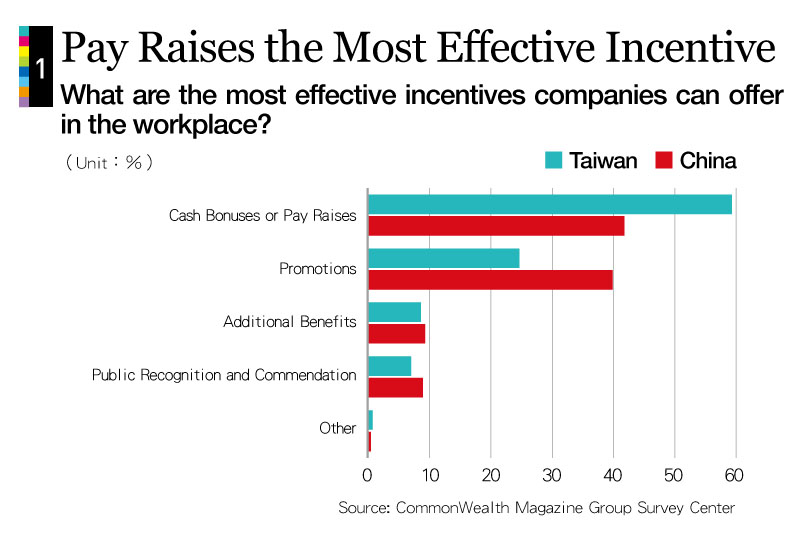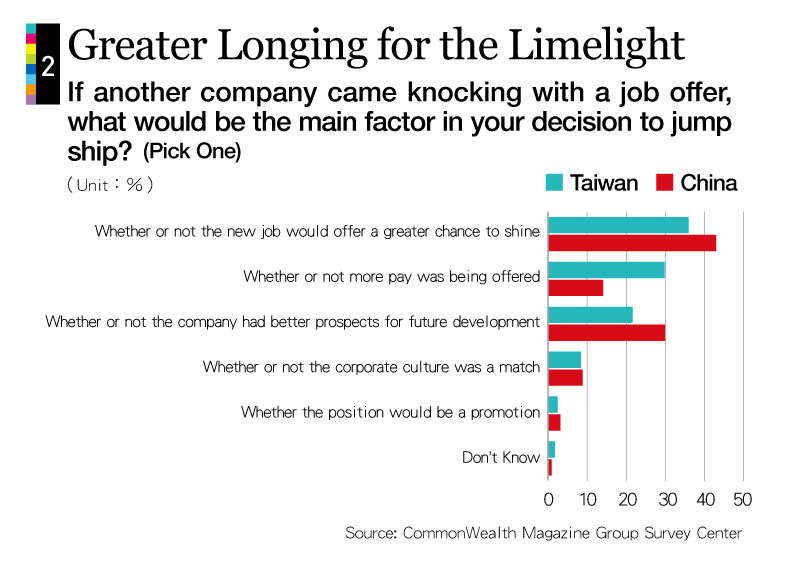The Post-90 Generation
Managing Those Difficult Young Workers

Source:CW
Averse to authority and often prodigal, the youngest crop of employees in Taiwan and China is giving companies grief. What managerial lessons are essential as enterprises approach the generational precipice?
Views
Managing Those Difficult Young Workers
By Ting-feng WuFrom CommonWealth Magazine (vol. 512 )
When CommonWealth Magazine arrived in Wuhan, Hubei Province for our scheduled interview with Fortune Electric Co., Ltd. chairman Sun Shiming, we had to wait a full 20 minutes.
"General Electric just happened to have sent some people over to discuss next year's orders," apologized a contrite Sun, ordinarily a stickler for precision and punctuality. "They said they were very satisfied with our project manager," Sun says, pausing for a moment before getting back on topic. "That manager is a child of the Post-90 Generation."
During the past year, both sides of the Taiwan Strait faced a simultaneous generational hand-off in the workplace. From Foxconn boss Terry Gou with a workforce of more than a million to Starbucks Taiwan with 3,000 employees, companies across the region had to face up to the moment of throwing open their doors to the Post-90 Generation (young people born after 1990).
Wuhan: Quality, Affordable Post-90 Kids
Fresh-faced workers at the Foxconn plant produce a steady stream of iPads and iPhone 5s. But members of the Post-90 Generation are no longer merely workers on an electronics goods assembly line.
They are voracious consumers of technology products. During working hours they may well be satisfied employees, but after quitting time, they become highly dynamic netizens. They are relatively worldly and knowledgeable with increasingly favorable financial circumstances at home, and companies are finding it harder and harder to get a feel for who they really are.
Just how is one to handle this strange young demographic?
To better understand this new generation entering the workforce, CommonWealth Magazine dispatched a reporting crew to Wuhan. Wuhan is ground zero for churning out children of the 90s for China, and perhaps the world as well.
Wuhan is known for having the most university students of any city in China, with 1.7 million. What's more, capable young people abound given that Wuhan University, Wuhan University of Technology and Huazhong University of Science and Technology are all well-known "National Key Universities" funded by the Education Ministry's "Project 211." Thus it comes as no surprise that such noteworthy Taiwanese companies as Master Kong, President and Foxconn have set up operations in the area.
"Wages are depressed here, and you only need to pay one-third to one-half what it would take in Beijing to retain your employees," says Wuhan University professor Shen Yang, going a step further to directly laud Wuhan's Post-90 Generation as "top quality at a bargain price."
Sheng Cheng, a senior at Wuhan University, decided he'd stay and try his luck in Wuhan. During his university studies he had done an internship in Beijing, where he saw with his own eyes what people mean by "high cost of living."
"Grabbing a bowl of noodles on the street in Wuhan will set you back 5 to 6 renminbi, but in Beijing it's more than twice that," he says, adding that the pressure in the coastal cities is just too much.
The day before CommonWealth Magazine spoke with him, Sheng had gone for an interview in the exurbs of Wuhan, a four-hour round trip. Unfortunately for him, he learned that very evening that he'd been passed over for someone else.
"He needs to get it together and find a job before the Lunar New Year holiday," says Sheng's sister, who once worked for Foxconn and holds high expectations for the family's only male with a university education. Sheng hopes he can bring some good news home to share with the family over the dinner table when they gather for the holiday feast.
Spending More Money than They Earn
Whenever the subject of the Post-90 Generation comes up, companies invariably have a litany of complaints.
"One of these Post-90 kids working for us verbally challenged the plant manager," relates Deng Daohong, a manager from Taiwan, his voice growing momentarily heated. "This kid told us the spending money his parents and grandparents gave him was more than the wages he earned working for us."
Deng came to China in 1994 as a Taiwanese exec and only recently left the factory for a management consulting company. He's found that the "iron discipline" that was once routine in companies runs into a brick wall when applied to the Post-90 Generation. The issue has now become an area consulting firms just can't keep up with.
A manager at a local Wuhan department store told CommonWealth Magazine the incredible tale of one Post-90 employee whose family delivered lunch to him at the store every day. This year the store hired six customer service personnel; only one has stayed on. Companies often bemoan employee attrition rates, arguing they wouldn't be so high if the Post-90 Generation could not so readily fall back on the support of their parents. As businesses see it, kids of the Post-90 Generation not only lack grounding, but quit at the drop of a hat and easily grow hostile. This is also closely related to their netizen identity.
Take the ongoing incidents of "pay disclosure" on the Internet. Young employees will post their pay stubs on the Internet for peer review, which often seems to have exacerbated the phenomenon of "lightning resignations."
Shen Yang, who has extensively researched trends in micro-blogging, surmises that the two chief characteristics of Internet postings are "sensitive" and "emotional." Sensitive topics can be filtered and concentrated, inciting an atmosphere of escalating hostility against the perceived enemy.
Yet there is also a chorus of Post-90 voices crying foul, insisting that it's only a few rotten apples that are spoiling the whole barrel.
Zhou Han is a third-year student in the Department of Environmental Art Design at Hubei University of Technology.
"It's a double burden being a member of the Post-90 Generation and a university student too. As soon as people hear my age, they automatically assume I'm only going to goof off and will be gone before too long," she acknowledges.
Just 20 years-old, Chen Shihan, a department store clerk, tries to avoid identifying herself to others as part of the Post-90 Generation, fearing people will assume she's unreliable.
So just how is this large number of rookies who are about to enter the workforce to be managed? Managers on both sides of the Taiwan Strait all have their own ideas on that.
Promotions, Pay Raises; Which is Effective?
"A lot of folks define business management as managing people and handling affairs. Wrong! It's about managing affairs and handling people. People don't like to be managed, especially the Post-90 Generation," insists Sun Zehou, director of the Department of Human Resources Management at Wuhan University of Technology. When dealing with the new generation, management must keep up with the times.
Deng Daohong has further found that at companies with high employee attrition rates there invariably exists a serious generation gap.
"Group leaders interact most closely with ordinary workers, but they tend to be middle-aged people, born in the 70s and 80s, and they still use blind obedience as their guiding principle in managing their Post-90 staff," Deng says.
Sun Zehou believes you have to first understand the Post-90 Generation before you can manage them. While the issue of pay raises poses a frequent headache for businesses, Deng thinks that money isn't really what the Post-90 Generation lacks, given that improvements in the overall economy mean that the burden of supporting families is no longer as onerous as it once was.
Two Post-90 workers that CommonWealth Magazine reporters met readily admitted they sent no money home from their monthly paychecks. But for the Post-90 Generation, take home pay has gradually shifted from a means of improving the family's lot in life to a criterion by which one's self-worth may be judged.
According to CommonWealth Magazine's cross-strait survey of university students, Post-90 Taiwanese actually value monetary and material compensation more than their Chinese.
Asked what would be the most effective incentive their companies could offer them, 41.8 percent of Post-90 Chinese respondents stated "pay raises or bonuses," lower than the 59.4 percent of Taiwanese respondents that concurred. (Table 1)

As for the factors influencing a decision on "whether to jump ship if another company were to come knocking the next year," most Post-90 Chinese respondents answered "whether or not the company's future prospects were brighter" while most Taiwanese respondents were more concerned with "whether or not the pay was better." (Table 2)

Thus, for Post-90 Chinese, training and career planning hold greater allure than cash.
In 2005, Fortune Electric in Wuhan went through a period of employee attrition, with rates reaching as high as 25 percent. But chairman Sun Shiming was of the belief that "pay raises can't go on indefinitely," so their solution was to provide local engineers an opportunity for exchange programs at the Taiwan headquarters "to give them the feeling of achieving personal growth through education and training by staying on with the company." Today, the annual employee attrition rate has fallen to just 10 percent.
Looser Grip Wins More Hearts
What's more, five years ago Fortune boldly scrapped company requirements that employees punch a clock. Yet, counter-intuitively, employee punctuality improved.
Deng Daohong further notes that the key to managing Post-90 staff is excellent communications and leadership skills among supervisors in the trenches. One major Chinese automaker even bought out entire blocks of a class on communication and leadership, filling the classroom several times in a row.
When the subject of the Post-90 Generation comes up, it's easy for one to draw an association with the tragic string of suicides at Foxconn workers' dormitories. But Sun unflinchingly insists that such a thing could never happen at Fortune.
Fortune provides no worker dormitories.
"We conducted an opinion poll and found employees don't like them, so we switched to a housing allowance," Sun says, adding that the company found young employees were relatively more able to stay on track as long as they had support from family and a good home life.
Starbucks Taiwan president Hsu Kuang-yu has also found that delegating an appropriate level of authority can win hearts and minds among the Post-90 Generation. Starbucks began giving shop managers the authority to hire new staff so there would be continuity in recruiting, training and employee retention, strengthening employee relations and even the staff relationship with the surrounding community.
Shen Yang reveals that a number of state-owned enterprises and Internet companies have contracted him to conduct "Corporate reputation management" surveys. In handling the Internet-oriented Post-90 Generation, a number of companies have begun collecting employee and corporate critiques via micro-bloggers to serve as a basis for improving the company.
With the entry of the Post-90 Generation into the workforce, management textbooks will have to turn to the next page. Whoever is first in comprehending that reading assignment will be the first to ride the crest of the competitive wave.
Nie Yong
Wuhan
19 years old
Fortune Electric Co., Ltd. staff member
Born, raised, schooled and working all in the same two sq. km area in Wuhan's Donghu and Xihu Districts, he's an offbeat Post-90 Generation tech geek. Nie relies mostly on his bicycle to get around. He's never left home but yearns to roam the outside world, and the further away the better. He dreams of pulling together enough funds to "travel through Africa."






